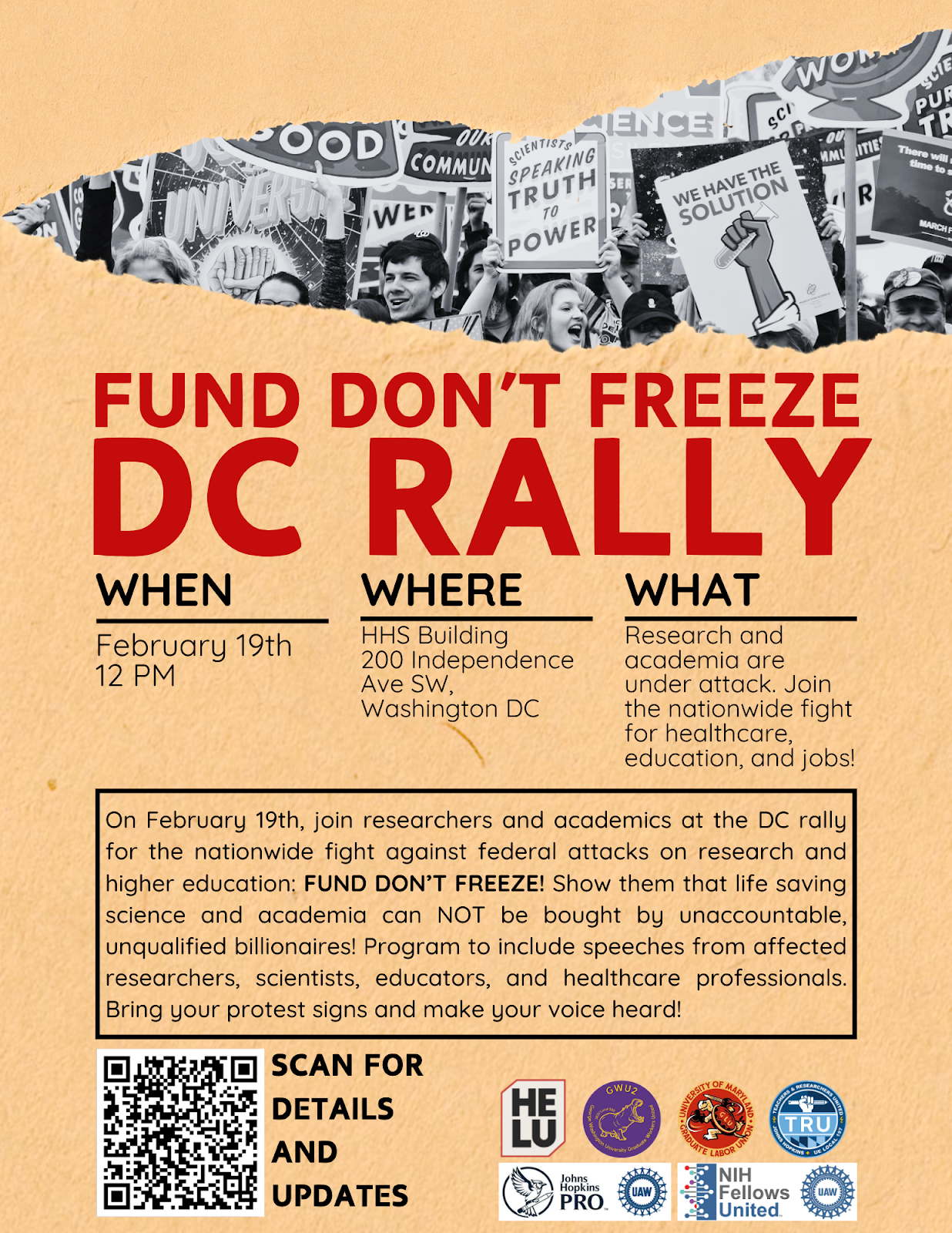
On February 19th at noon, join workers, researchers and academics at the DC rally at the headquarters of Health and Human Services, 200 Independence Ave. SW, for the nationwide fight against federal attacks on research and higher education. Show them that life-saving science cannot be bought by unaccountable, unqualified billionaires! federal workers and everyday Americans are coming together to say NO to Elon Musk’s push to gut federal services and impose mass layoffs.
Our demands:
- NO cuts to vital services
- NO mass layoffs: respect union workers’ contracts
- END the funding freeze
Wear red, white, and/or blue. Bring signs about how your community benefits from federal services. This is a family-friendly event. All are welcome. Part of the Save Our Services national day of action.
What: Fund Don’t Freeze: Rally at HHS Headquarters
When: February 19, 12 pm noon
Where: HHS Headquarters, 200 Independence Ave. SW
Supported by Federal Unionists Network, Higher Education Labor United (HELU), University of Maryland Graduate Labor Union, George Washington University Graduate Workers Union (GWU2), John Hopkins PRO-UAW, and NIH Fellows United.
Federal Unionists Network
District of Columbia
02/19/2025 at 12:00PM
Climate Action Against Disinformation would like to invite you to Techno-Feudalism: Big Carbon and Big Tech’s Disinfo, a webinar on Wednesday about how Big Tech and Big Carbon’s team-up makes disinformation an even bigger problem than ever before. Fortunately, we’ll be talking about some big solutions, as Brazil takes the reins on international climate negotiations ahead of COP30.
This CAAD webinar will feature Professor Jennifer Jacquet, to discuss research on Big Ag’s climate disinfo, followed by new findings on Big Tech’s bad behaviour from the Center for Countering Digital Hate’s Imran Ahmed. Having laid bare the problems, we’ll hear about some potential solutions from Founder and CEO of FALA, Thais Lazzeri, who will offer some hope about Brazil’s pursuit of real regulations and policy changes to stop the spread of disinformation. After that, we’ll open the floor for attendees to ask questions and share their own perspectives.
Speakers:
- Jennifer Jacquet, Professor of Environmental Science and Policy at the Rosenstiel School of Marine, Atmospheric, and Earth Science at the University of Miami
- Imran Ahmed, Center for Countering Digital Hate
- Thais Lazzeri, Founder and CEO of FALA
RSVP
Climate Action Against Disinformation
02/19/2025 at 11:00AM
Full committee hearing, originally scheduled for February 12.
Nominee:
- Lori M. Chavez-DeRemer, Happy Valley, OR
“I’m a hard ‘no’ on her. She didn’t bow out of this job when she found out Trump was going to force her to act illegally.” - Sen. Chris Murphy (D-Conn.)
“I’m not supporting nominees as long as the lawlessness continues.” - Sen. Andy Kim (D-N.J.)
Ranking member Bernie Sanders (I-Vt.) and former chair Sen. Patty Murray, D-Wash., both said they’ll wait for the hearing before commenting.
Sen. Tammy Baldwin, D-Wis., said she’s not ruling out a yes vote just yet: “I’ll give her a fair shake.” Asked about Democrats souring on all Trump nominations as he steamrolls over Congress, she said: “There are folks with sentiment. I try to view each nominee through the lens of whether they will help or hurt Wisconsin.”
“We need a majority. We need somebody else to vote if Rand’s going to vote negative … Rand is a chair of the right-to-work caucus. So once he establishes something, it’s hard to move him off.” HELP Chair Bill Cassidy (R-La.)
Reporting from Semafor’s Burgess Everett
Senate Health, Education, Labor, and Pensions Committee
216 Hart
02/19/2025 at 10:00AM
A full committee hearing entitled “Improving the Federal Environmental Review and Permitting Processes.”
Witnesses:
- Leah Pilconis, General Counsel, The Associated General Contractors of America
- Carl Harris, Chairman of the Board, National Association of Home Builders
- Jeremy Harrell, CEO, ClearPath
- Brent Booker, General President, LiUNA Action Network
- Nicole Pavia, Director, Clean Energy Infrastructure Deployment, Clean Air Task Force
Senate Environment and Public Works Committee
406 Dirksen
02/19/2025 at 10:00AM
Full committee hearing.
Nominee:
- Paul Lawrence Ph.D., Nominee to be Deputy Secretary of Veterans Affairs
Over 1000 Veterans Affairs employees were hit by illegal mass layoffs last week.
Senate Veterans Affairs Committee
418 Russell
02/19/2025 at 09:30AM

Public service taught us to fight for the American people, and we’re gonna keep fighting.
If you are a laid off federal worker, meet us Tuesday, 2/18, 10am ET at the Dirksen cafeteria for a job search and to show senators what happens when they let an oligarch take over. We’re gonna fight for our jobs, fight for the public, and put the pressure on senators to do the same.
Federal Workers Against DOGE
Dirksen
02/18/2025 at 10:00AM

Protest to uphold the Constitution and limit executive overreach!
At the Reflecting Pool in front of the U.S. Capitol, noon.
printable flyers
50-50-1
District of Columbia
02/17/2025 at 12:00PM
_(2).png)
Federal workers are under attack. Many people, and the planet, are at stake. But workers are standing up and fighting back.
This Valentine’s Day, show your love for workers and the world by joining the Labor Network for Sustainability and EPA employee union AFGE Council 238 for a special solidarity call. We will hear from EPA workers and leaders on the front lines of Trump’s attacks, and learn how we can take action to defend workers, the civil service, and a livable planet.
Speakers include:
- Marie Owens Powell, President, AFGE Council 238
- Joyce Howell, Executive Vice President, AFGE Council 238
- Justin Chen, President, Dallas E.P.A Local
- Holly Wilson, President, North Carolina E.P.A Local
Together, we are powerful. And this moment calls on us to stand together. RSVP for the Zoom link. We will see you on Friday!
American Federation of Government Employees
Greenpeace
Labor Network for Sustainability
02/14/2025 at 01:00PM

Love DC! Dump Trump!
Community rally and speak out.
Black Lives Matter Plaza
Organized by Free DC and Harriet’s Wildest Dreams
Free DC
District of Columbia
02/14/2025 at 12:00PM

Join us this Friday, February 14 at 8am to rally outside the Department of Health and Human Services (HHS) headquarters to show love to federal workers and tell them: We’ve got your back, and we’re counting on you to stand firm against DOGE as billionaires seek to tear our country down. This moment demands bravery, and to federal public servants: we know you have it in you.
Federal public servants are America’s front line — moving mountains behind the scenes every day to protect America’s health, America’s safety, America’s jobs, and more. Federal public servants are some of the most patriotic people out there — people who have pursued the call to serve their country. Now, Trump has handed power over to Elon Musk destroy the federal government, enrich himself, label it as “waste,” and leave federal workers and the public they serve with nothing.
We have to fight back.
At this rally, we will distribute notes of support to federal workers on their way to work, rally alongside public servants in support of the critical services they provide to us, and fight back against DOGE. Join us starting at 8am on Valentine’s Day to support workers and oppose the DOGE takeover!
This event is kid-friendly — parents whose kids are out of school that day are more than welcome to join. Please take the Metro or walk to HHS – the closest DC Metro stations are Federal Center and L’Enfant Plaza.
Location: Department of Health and Human Services Headquarters
200 Independence Ave. SW at 3rd St SW
Fork Off Coalition
District of Columbia
02/14/2025 at 08:00AM



_(2).png)

